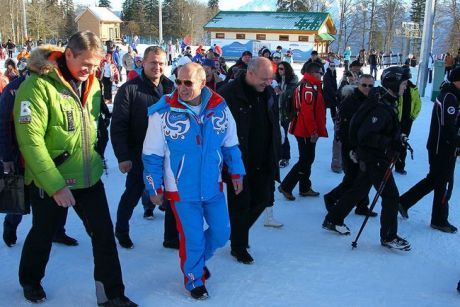News
You are here
Putin's homophobic Olympics

August 6, 2013
In June of this year the Russian Parliament with the support of President Vladimir Putin adopted what the LGBT community is calling “some of the most regressive, discriminatory and overtly homophobic/transphobic legislation that we have seen in recent years.”
The Russian law now bans “propaganda of non-traditional sexual relations,” which means it threatens prison time and heavy fines for people who acknowledge the existence of LGBT people in public forums such as the internet, class rooms, or on the streets.
Interviewed on CBC Radio's Day 6, Masha Gessen, author of the Putin biography, The Man Without a Face, said the Russian leader is waging a culture war on the “quintessential other” for political power. Gessen said, “On the one side of this war is his shrinking constituency, which he views as Russian traditionalists in every sense. So they're nationalists. They are socially very conservative. They identify as Russian Orthodox, and they buy the line that Russia is surrounded by enemies who are out to destroy it and who were also behind the protest movement last year.”
The international reaction has been swift. Harvey Fierstein, longtime LGBT rights activist, wrote a scathing editorial in the New York Times, pointing out that Russian lawmakers are threatening LGBT Olympic competitors and fans with arrest.
Canada's Foreign Affairs Minister John Baird outlined to the CBC details of eight meetings since January where Canadian officials pressured Russians to not sign the bill. Baird does not support a boycott of the Olympics, but said, “it provides a spotlight on this mean-spirited and hateful law.” These are good words, but hypocritical coming from Tory mouths. As a committed member of the NATO alliance, Baird is repeating the pinkwashing rhetoric he used last year against Iran, which distracts from the Tories own homophobic and transphobic policies--from cutting funding to Pride Toronto, removing references to gay rights and equal marriage fromt he Citizenship guide, and opposing the trans rights Bill C-279. While opposing the repressive Russian regime, Baird does not want anything to interfere with Canadian corporations who want to join in the profit-making from the Olympics.
The Olympic Games have a long history as a site for governments to make a political stand. Some were motivated by civil rights, from the 1964 Tokyo Olympic's ban on South Africa for its apartheid regime, to the boyvott by 32 African countries of the 1976 Montreal Olympics for its refusal to ban New Zealand--whose rugby team had toured in South Africa. Other boycotts were more motivated by inter-imperial rivalry between Washington and Moscow: at the 1980 Moscow Olympics, the US led a boycott of 65 countries over the USSR's invasion of Afghanistan, and at the 1984 Los Angeles Olympics the USSR and 13 allies boycotted in retaliation.
But often the IOC has maintained a stance of "neutrality" that makes them complicit with attacks on civil liberties, from holding the Olympics in Germany in 1933, to suspending Tommie Smith and John Carlos in 1968 for their black power salute. For the upcoming Olympics the IOC only made assurances to athletes that they will not be discriminated against, warning that they do not want any demonstrations in one or the other direction. This "apolitical" stance is worrisome in that it accepts the double standard offered to the Russian people.
Russian sports minister Vitaly Mutko made things quite clear when he said, “An athlete of nontraditional sexual orientation isn't banned from coming to Sochi. But if he goes out into the streets and starts to propagandize, then of course he will be held accountable.”
What kind of Olympics is this going to be then? “This isn't an Olympics” writes David Zirin, sports editor at The Nation, “It's more like a heist. The almighty Putin is . . . attacking the LGBT community in a cheap effort to turn attention away from rampant corruption and growing inequality, symbolized sharply by what's happening in Sochi.”
Section:
Topics:










